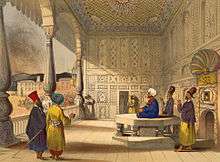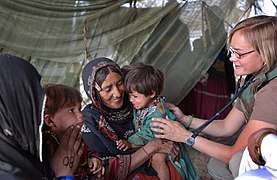Kochi people
Kochis or Kuchis (Pashto: Kuchis according to J. Derakhshani the name derives from Guci, formerly Chinese: 月氏; pinyin: Yuèzhī) are nomads from Northern- and Eastern Pakistan and Afghanistan primarily from the Ghilji Pashtuns. Some of the most notable Ghilji Kochi tribes include the Kharoti, Niazi, Andar, Akakhel and nasar Ahmadzai. Occasionally there may also be some Baloch people among them that live a pastoral nomadic lifestyle.[1] In the Pashto language, the terms are Kochai (singular) and Kochian (plural). In the Persian language, "Kochi" and "Kochiha" are the singular and plural forms (respectively).
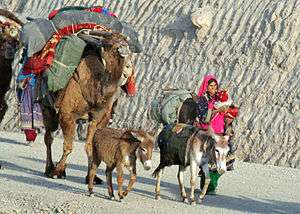

| Part of a series on |
| Pashtuns |
|---|
| Kingdoms |
Description
The National Multi-sectoral Assessment of Kochi in 2004, estimated that there are about 2.4 million Kochis in Afghanistan, with around 1.5 million (60%) remaining fully nomadic, and over 100,000 have been displaced due to natural disasters such as flood and drought in the past few years.[2]
The nomads and semi-nomads, generally called Kuchi in Afghanistan, mostly keep sheep and goats. The produce of the animals (meat, dairy products, hair and wool) is exchanged or sold in order to purchase grain, vegetables, fruit and other products of settled life. In this way an extensive network of exchange has developed along the main routes annually followed by the nomads. The merchant Powindah (Ghilji) [or Ghilzai] Pashtuns used to move annually from the Afghanistan mountains to the valley of the Indus. These long-distance migrations were stopped in the early 1960s when the border with Afghanistan and Pakistan were closed, but many Kuchis are still allowed to cross as border officials recognize the Kuchi migrations which occur seasonally and allow them to pass even in times of political turmoil. In recent decades, migrations inside Afghanistan continue, although trucks are now often being used to transport livestock and family from one place to another.[3]
History
Kochis historically abstained from politics, because they are nomadic, but under Afghanistan's constitution, they were given ten seats in parliament.[4] Provisions are written into the Afghanistan Constitution (Article 14) aimed at improving the welfare of Kochis, including provisions for housing, representation, and education.[5] According to the United Nations High Commission for Refugees, before the 30 years of war, Kochis owned 30 per cent of the country's goats and sheep and most of the camels for years, and they were largely responsible for the supply of slaughter animals, wool, ghee and quroot to the national economy.[6]
Kochis were also favored by the Kings of Afghanistan, who were themselves ethnic Pashtuns, since the late 1880s. They were awarded "firman," or royal proclamations, granting them use of summer pastures all over Afghanistan including the northern parts of the country.[7][8][9] During the Taliban era, Kochis were a main factor and supporter of the Taliban and their leader Mohammed Omar[10] As a result, the northern ethnic groups (Hazara, Tajiks, Uzbeks and Turkmens) have a long-standing distrust of the Kochi. This political dispute has been deepened over the decades of Kochi transhumance, whereby some Kochis became absentee landlords in their summer areas in the north through customary seizure procedures to attach debtors' land. However, the Kochis themselves see the northern minority groups as a non-Afghan race, and claims the Kochis were natives of northern Afghan region, and that during many years of invasion such as Genghis Khan and Timur, they escaped south.
Kochis have been identified by the United Nations Assistance Mission in Afghanistan as one of the largest vulnerable populations in the country. As Afghanistan's population grows, competing claims over summer pastures, both for rainfed cultivation and for grazing of the settled communities' livestock, have created conflict over land across central and northern Afghanistan. Paying head-count fees for each animal crossing someone else's property is exacting a harsh economic toll on the Kochi way of life, one that is already having to contend with recurrent droughts that are now occurring with increasing frequency.[11][12] There are communities of Pashtun Kochi origin in other parts of the world as well, including in the Caribbean, Africa and Europe. In Pakistan, some Kochis are found in Karachi in Sindh.
Kochi among Taliban
According to a classified cable sent by U.S. Ambassador to Afghanistan Karl Eikenberry—revealed by WikiLeaks—Abdul Wahab Sulemankheil, Director General (DG) of the Independent Directorate of Kochis, declared that more than half of the Taliban are Kochis, a figure doubted by Eikenberry:
The DG noted the Kuchis have always played an important role in Afghan society, both in living the traditional nomadic lifestyle of the ancient Afghans, and in their involvement in the wars and revolutions that have torn Afghanistan apart. The Kuchis continue to play such a role now. Opponents of the various Afghan governments have historically manipulated and played on Kuchi dissatisfaction to incite revolution and fuel opposition to foreign involvement in Afghanistan. The DG said the Taliban have gained Kuchi support by manipulating Kuchi dissatisfaction with the government. The DG estimated that over 1/2 of Taliban are Kuchis, who had been easily persuaded to side with the Taliban out of ignorance. For example, in his home province of Paktika, the majority of Taliban commanders are Kuchis. (Comment: The Other Government Agency office estimates Kuchis comprise only a single-digit percentage of the Taliban. The DG may be inflating the participation of the Kuchis in the Taliban movement to ensure Kuchi interests are considered in any peace-promotion efforts.[13]
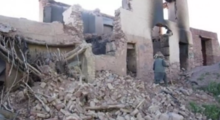
Every year, the fully armed Kochis backed by the Taliban attack on Hazara people and their land resulting in displacing and killing local Hazaras and burning and looting their home. [14][15][16][17][18]
Gallery
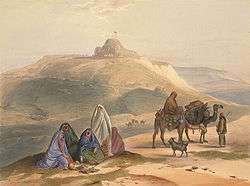 An 1848 lithograph showing Ghilji nomads in Afghanistan
An 1848 lithograph showing Ghilji nomads in Afghanistan- Kochis near Tarinkot, Urozgan Province of Afghanistan
 Kochi tent near the Kabul-Jalalabad Road
Kochi tent near the Kabul-Jalalabad Road A young Kochi girl
A young Kochi girl
Footnotes
- NPS. "Program for Culture and Conflict Studies at NPS - Home". nps.edu.
- World Food Program, Socio-economic profile, Population and Demography, Afghanistan. Retrieved at "Archived copy". Archived from the original on 2012-12-18. Retrieved 2012-03-29.CS1 maint: archived copy as title (link)
- Willem Vogelsang (2002), p. 15.
- Paxton, Pamela Marie and Melanie M. Hughes. "Women, politics, and power: a global perspective". Pine Forge Press, 2007, p. 151.
- "Afghanistan Online: The Constitution of Afghanistan". afghan-web.com.
- UNHCR, Formation of 4 Kuchi sheep/goat breeders’ service centres, Durable solutions for Kuchi IDP's in the south of Afghanistan: Options and opportunities, Asia Consultants International, pg. 15
- Lansford, Tom (2003) A Bitter Harvest: US foreign policy and Afghanistan Ashgate, Aldershot, Hants, England, ISBN 0-7546-3615-1, page 16: "The modern history of Afghanistan has witnessed a "Pashtunization" of the state as the customs, traditions and language of the Pashtuns have combined with the groups political power to erode the distinctive underpinnings of Afghanistan's other groups.FN20". FN20 cites: US, Department of the Army, Afghanistan: A Country Study, 5th ed. reprint (Washington, DC.: GPO, 1985) page 108.
- O. Roy, Ethnic Identity and Political Expression in Northern Afghanistan, in Muslims in Central Asia: Expressions of Identity and Change, 1992, ISBN 0-8223-1190-9.
- Afghanistan, by Gilles Dorronsoro
- "Wandering Kuchis pay for their Taliban links". theage.com.au.
- http://www.khaleejtimes.com/DisplayarticleNew.asp?section=todaysfeatures&xfile=data/todaysfeatures/2008/August/todaysfeatures_August9.xml Archived 2011-06-08 at the Wayback Machine
- "Archived copy". Archived from the original on 2008-12-10. Retrieved 2008-12-22.CS1 maint: archived copy as title (link)
- Eikenberry, Karl (16 August 2009). "DIRECTOR OF KUCHI DIRECTORATE: FEW KUCHIS WILL VOTE, AND WILL VOTE FOR KARZAI". WikiLeaks. Retrieved 18 July 2015.
- https://www.hazara.net/kuchis/kuchis.html
- https://www.kabulpress.org/article109705.html
- https://www.kabulpress.org/article66648.html
- http://www.hazarapeople.com/2018/05/08/hazara-villages-in-ghazni-and-maidan-under-attack-of-kochis-and-taliban/
- https://www.afghanistan-analysts.org/en/reports/war-and-peace/the-kuchi-hazara-conflict-again/
References
- Vogelsang, Willem. 2002. The Afghans. Blackwell Publishers, Oxford. ISBN 0-631-19841-5
External links
| Wikimedia Commons has media related to Kuchi people. |
| Look up Kochi in Wiktionary, the free dictionary. |
- Lifestyle of Kuchi community
- AFGHANISTAN: Threat of ethnic clashes over grazing land
- Afghanistan Research and Evaluation Unit
